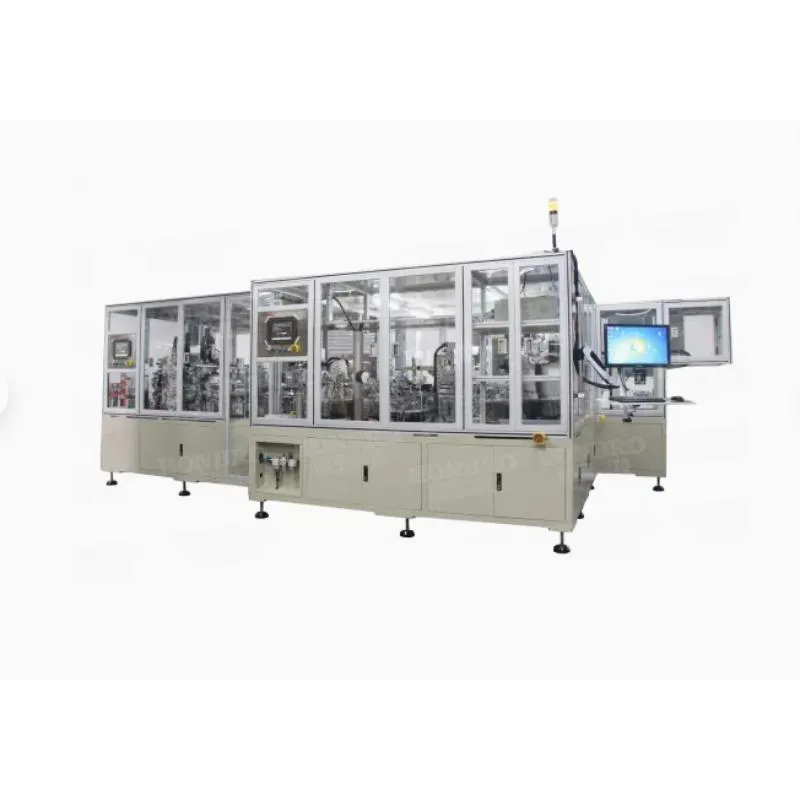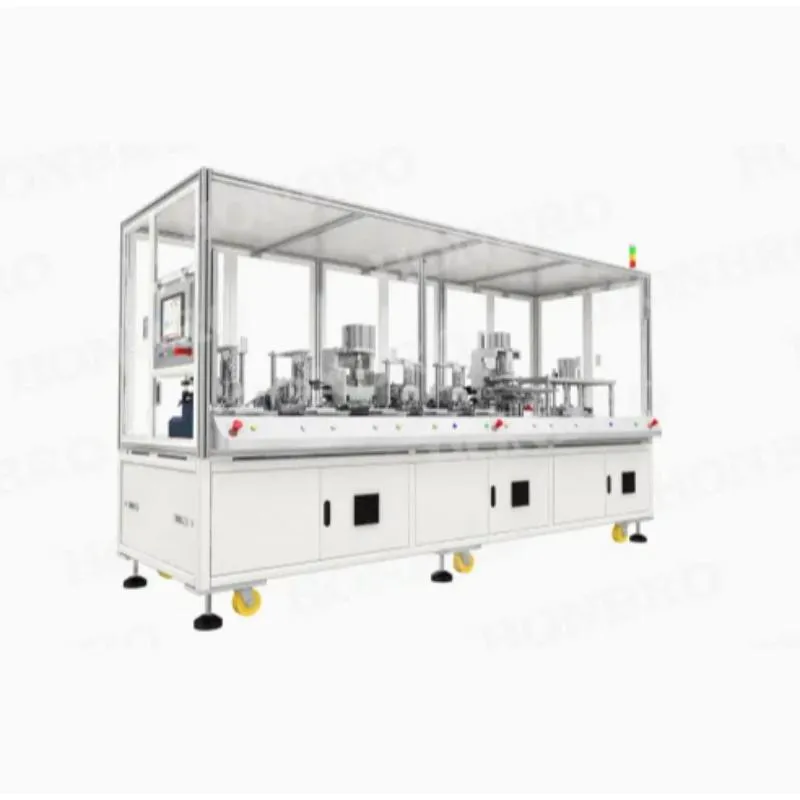Precision Lithium Ion Battery Assembly Machine for Efficiency
Understanding the Modern Lithium-Ion Battery Assembly Landscape
The global shift towards sustainable energy and electric mobility has profoundly accelerated the demand for advanced lithium ion battery assembly machine solutions. These sophisticated machines are the backbone of modern lithium battery production lines, enabling the precise and efficient manufacture of battery packs for diverse applications ranging from electric vehicles (EVs) and energy storage systems (ESS) to portable electronics. The industry is witnessing significant trends, including increased automation, enhanced precision requirements for higher energy density cells, and the integration of smart manufacturing principles like Industry 4.0, which emphasizes data-driven processes and predictive maintenance. This evolution directly impacts the core competencies required for a robust battery production line, pushing manufacturers towards more integrated and adaptive solutions.
The drive for higher energy density, faster charging capabilities, and extended cycle life in lithium-ion batteries necessitates unparalleled accuracy and reliability in every stage of assembly. Manufacturers of lithium battery equipment are thus focusing on developing machines that can handle new cell formats (e.g., blade cells, cylindrical 4680), intricate welding techniques, and sophisticated quality control measures. The competitive landscape demands not only high throughput but also minimal material waste and maximum safety throughout the assembly process. This article delves into the critical aspects of these advanced machines, providing insights for B2B decision-makers and technical personnel aiming to optimize their lithium ion battery production line.
The Advanced Manufacturing Process of Lithium-Ion Battery Assembly Machines
The manufacturing of a high-performance lithium ion battery assembly machine itself is a complex process demanding precision engineering and robust material selection. Typically, the foundational frame and structural components of these machines are crafted from high-grade, precision-machined aluminum alloys or steel, often undergoing processes such as CNC machining for critical parts to ensure geometric accuracy and stability. Specialized components like laser welding heads, high-speed sorting mechanisms, and robotic arms incorporate materials selected for their durability, thermal stability, and low coefficient of thermal expansion. For instance, motion control components often use hardened steel for linear guides and ceramic materials for specific insulation requirements.
The manufacturing processes employed include precision casting for intricate parts, CNC milling and turning for high-tolerance components, and advanced welding techniques to assemble machine frames. Surface treatments, such as anodizing for aluminum and specific coatings for steel, enhance corrosion resistance and wear characteristics. Each component undergoes rigorous quality assurance, adhering to international standards like ISO 9001 for quality management systems and ANSI for dimensional tolerances. The expected operational lifespan of a well-maintained lithium ion battery assembly machine can exceed 10-15 years, a testament to the robust engineering. These machines are predominantly used in industries such as electric vehicle manufacturing, grid-scale energy storage, consumer electronics, and specialized industrial battery production, offering advantages like superior precision, high throughput, and enhanced safety protocols which lead to reduced material waste and improved battery pack consistency.

Key Technical Parameters of Lithium-Ion Battery Assembly Machines
To aid in comparing and selecting the most suitable lithium ion battery assembly machine, a detailed understanding of key technical parameters is essential. These parameters directly influence the efficiency, precision, and overall output of a lithium battery production line.
| Parameter | Description | Typical Range / Value |
|---|---|---|
| Production Capacity | Number of battery modules/packs assembled per minute/hour. | 2-10 modules/min (for EV packs), 50-150 cells/min (for cell sorting/stacking) |
| Assembly Precision | Positional accuracy of components during welding/placement. | ±0.01 mm to ±0.05 mm |
| Applicable Cell Types | Pouch, prismatic, cylindrical (18650, 21700, 4680, etc.). | Versatile, adaptable to multiple formats via tooling changeovers |
| Welding Method | Primary technique for electrical connections (e.g., laser, ultrasonic). | Laser Welding (Fiber, YAG), Ultrasonic Welding |
| Automation Level | Degree of human intervention required (semi-auto, fully auto). | Fully Automatic with robotic integration is standard |
| Overall Dimensions | Footprint of the machine. | Varies significantly by capacity, e.g., 3m x 2m x 2.5m (LxWxH) per module |
| Power Requirements | Electrical power consumption. | 20 kW - 80 kW, depending on configuration and laser power |
| Quality Control Integration | Built-in inspection systems (vision, electrical testing). | Integrated Vision Systems, IR Temperature Monitoring, Electrical Resistance Testing |
Application Scenarios and Technical Advantages
The versatility of a modern lithium ion battery assembly machine makes it indispensable across several high-growth sectors. In the automotive industry, these machines are fundamental for mass producing high-voltage battery packs for electric vehicles, hybrid vehicles, and electric buses. The precision of processes like tab welding, busbar connection, and module assembly directly impacts vehicle range, safety, and lifespan. For the energy storage sector, particularly grid-scale ESS and residential energy storage, the demand is for machines capable of assembling large, robust battery modules designed for long-term reliability and high cycle counts. These applications leverage the machine's ability to handle large format cells and ensure robust interconnections.
In the consumer electronics market, where miniaturization and high energy density are paramount, a specialized lithium ion battery assembly machine facilitates the delicate assembly of compact battery packs for smartphones, laptops, and power tools. The technical advantages are manifold:
- Precision and Repeatability: Advanced robotics and vision systems ensure micron-level accuracy in cell alignment and welding, leading to consistent performance and extended battery life.
- High Throughput: Optimized motion control systems and multi-station designs significantly boost production volume, meeting the aggressive targets of a modern battery production line.
- Flexibility and Adaptability: Modular designs allow for quick changeovers between different battery cell formats and pack configurations, offering manufacturers agility in a rapidly evolving market.
- Enhanced Safety: Integrated safety features, including automated fault detection, fume extraction, and interlocks, protect both personnel and the valuable battery cells from damage during assembly.
- Improved Quality: Real-time monitoring and data collection during the assembly process enable immediate identification and correction of anomalies, drastically reducing defect rates and improving overall product quality.

Custom Solutions and Trusted Partnership
Choosing the right lithium ion battery assembly machine often involves more than just off-the-shelf solutions. Many battery manufacturers require highly specialized configurations to meet unique production demands, specific cell chemistries, or novel battery pack designs. Reputable vendors excel in providing customized solutions, working closely with clients from initial concept to final commissioning. This includes designing bespoke automation lines, integrating specific welding technologies (such as our Laser Welding Machine for Energy Storage Battery, Electric Motorcycle Battery), and developing custom software for enhanced process control and data analytics.
A key differentiator for a reliable supplier is their commitment to support and partnership. Our company, with years of experience in high-precision automation, holds ISO 9001 certification, reflecting our adherence to stringent quality management standards. We have successfully deployed lithium battery production line equipment for leading automotive OEMs and major energy storage providers, solving complex assembly challenges and significantly improving their production efficiencies. For instance, in one recent project, we designed a custom cell-to-pack assembly line that reduced overall cycle time by 15% for a large-scale EV battery manufacturer, demonstrating our capacity for innovative engineering and reliable execution.
Frequently Asked Questions (FAQ)
- Q: What is the typical delivery period for a custom lithium ion battery assembly machine?
A: Delivery periods vary based on complexity, but typically range from 12 to 24 weeks from order confirmation to factory acceptance testing. - Q: What kind of warranty and after-sales support do you offer?
A: We provide a standard 12-month warranty on all equipment, with options for extended coverage. Our comprehensive after-sales support includes remote diagnostics, on-site technical assistance, spare parts availability, and regular maintenance services. - Q: Can your machines handle different battery chemistries (e.g., LFP, NMC)?
A: Yes, our machines are designed with flexibility in mind and can be configured to process various lithium-ion battery chemistries, ensuring optimal welding parameters and handling procedures specific to each.
Authoritative References
- Journal of Power Sources. "Advanced Manufacturing Techniques for Lithium-Ion Battery Packs."
- Electrochemical Society Interface. "Challenges and Opportunities in Gigafactory Scale Battery Production."
- IEEE Transactions on Industrial Electronics. "Automation and Quality Control in Battery Assembly Processes."
- Batteries (MDPI). "Innovations in Laser Welding for Electric Vehicle Battery Manufacturing."
Share
-
Lithium Battery Welding Machine | High-Precision, Fast, SafeNewsNov.17,2025
-
Aluminium Guide Roller | Anodized, Lightweight, Low-NoiseNewsNov.17,2025
-
Tofu Cat Litter Bulk – Eco, Low-Dust, Fast Clumping SupplyNewsNov.17,2025
-
Equipment for Lithium Cell Assembly | Automated & PreciseNewsNov.10,2025
-
Square File Tool – Precision Cut, Hardened Steel, VersatileNewsNov.10,2025
-
Lithium Ion Battery Assembly Machine | Automated, High-SpeedNewsNov.10,2025







